Commentary
Ep. 607 "The Best Laid Plans," Or Little Headaches And 50 Shades Of Earl Gray Or Major Gray."
- by May 13, 2013
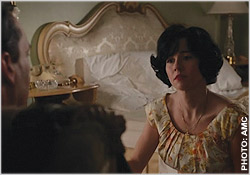 Beware the Weiner doctrine: It seems that any unexpected bit of sunshine, energy or pleasure offered one week inevitably brings a downpour of existential
gloom and disorientation the next.
Beware the Weiner doctrine: It seems that any unexpected bit of sunshine, energy or pleasure offered one week inevitably brings a downpour of existential
gloom and disorientation the next.
But we’re hooked. We’ve entered into an S & M relationship with Mad Men show runner Matt Weiner. We get our necks snapped going from dread to hope week after week, but he never gives up dominance.
The episode resonated with recurrent themes: loss, control, the idea of home, leaving or finding it, and the feelings of
relative safety, warmth and acceptance found within, all rooted to the need for Mommy.
So it goes with Don, or shall we call him Dom? He enters into a truly distressing (and
considering the news in Ohio, badly timed) dominant/submissive relationship with his mistress Sylvia.
Because whether sabotaging others in business or subverting his own personal
happiness, deep down, handsome and dashing Don Draper will always be the neglected, motherless child Dick Whitman.
The episode starts in that familiar vertical conveyance, an elevator, with
Don overhearing his Lady of the Sacred Babushka shouting at her hubby, the formerly sainted Dr. Rosen. "Tell them how you don't listen to anyone because you have it all figured out," she says, which
would seem to apply to her adman lover as well.
advertisement
advertisement
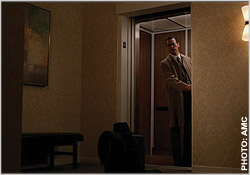 She’s cutting him down, telling him he’s
selfish, that he never took care of her. Apparently, hubby’s all packed and ready to move to Minnesota (the Mayo Clinic?) while she’s throwing her weight around at home. Moves happen
fast on this show.
She’s cutting him down, telling him he’s
selfish, that he never took care of her. Apparently, hubby’s all packed and ready to move to Minnesota (the Mayo Clinic?) while she’s throwing her weight around at home. Moves happen
fast on this show.
Indeed, within a few weeks of the spur-of-the-moment oral agreement between Ted and Don, it’s, as Ted C. puts it “the first day of school." The two agencies are merging under one roof in the not-exactly-welcoming Sterling Cooper offices. Some of the kids have their pencils sharpened to a fare-thee-well, while substance and behavior problems emerge immediately in the schoolyard.
Everybody’s discombobulated and things are topsy-turvy.
“Do you know where you’re going?” Ted asks Peggy. Burt Cooper, meantime, welcomes the new agency by praising it for winning a Clio for a “Little Headaches” commercial for St. Joseph’s “aspir-ine.” (Saint Joseph is the patron saint of workers, by the way.)
 No matter how much praying goes on, however, the women
sense a familiar pattern. Peggy asks Joan how her boy is, and Joan tells her “he’s all the man I need.” Meanwhile, Joan returns the question, and Peggy responds with info about the
building she bought with (or not) to live in with her manchild Abe. They seem to agree that amid all the chaos, nothing has changed at the agency overall: Women are not penetrating the inner sanctum
of male power.
No matter how much praying goes on, however, the women
sense a familiar pattern. Peggy asks Joan how her boy is, and Joan tells her “he’s all the man I need.” Meanwhile, Joan returns the question, and Peggy responds with info about the
building she bought with (or not) to live in with her manchild Abe. They seem to agree that amid all the chaos, nothing has changed at the agency overall: Women are not penetrating the inner sanctum
of male power.
But not all the men are being rewarded. Pete finds himself chair-less, and gets interrupted and called home, where his demented mother has landed. Although she’s
not in her right mind much of the time, she’s lucid enough to sense that he is no longer with Trudy, and that he is a man without a home, professionally and personally.
Many
will be fired for redundancy—and the employee counterparts and doubles are amusing. Jim Cutler, (Harry “Power Eyewear” Hamlin) whom Peggy described as “Roger with bad
breath” has seemingly hit the Just for Men; his striking white/gray hair is now an unexceptional shade of brown.
But speaking of Roger, he’s back with the zingers. He had some of the laugh-out-loud lines of the night, such as: “You’ve got your creative: Peggy, Beany and Cecil.”
Roger shocks head of accounts Burt Peterson by having the audacity to fire the poor guy for a second time. “You’re a real prick, you know that,” Burt says. “Damn it Burt, you stole, my goodbye,” Roger responds.
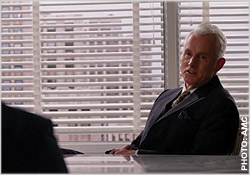 Earlier, in a brilliant little piece of writing, Peterson had called Don “the same cold fish.” Later, when Don tries to drink Ted under the table to show his
dominance, Ted mentions the he should eat something, and cold Don says, “Doesn’t ice count?”
Earlier, in a brilliant little piece of writing, Peterson had called Don “the same cold fish.” Later, when Don tries to drink Ted under the table to show his
dominance, Ted mentions the he should eat something, and cold Don says, “Doesn’t ice count?”
Peterson mentions “the worm turning.” And this sets up the possibility of a revenge scenario for so many of the players. Certainly, Peggy has to dress down her former boss for acting like such a jealous child with Ted. “Move forward” she tells him, mirroring what he had advised her all those years ago. But he’s really stuck. Don’s really dickish side emerges as he begins a pissing contest with Ted, who is an honorable guy.
I do love when the show gets off the existential horror grind to go back to showing how advertising is created. For the Fleishmann margarine account (the fakest of fake things), Don goes back 1930s-style verities: the farm table, flapjacks, yellow eggs. He mentions Dorothea Lange, who took photos during the depression, the famous Dust Bowl mother and her starving children.
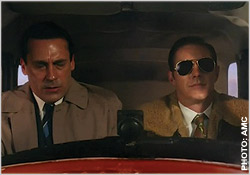 Whereas Ted, despite the penchant for using embarrassingly groovy lingo, goes to the more modern and enduring pop-cultural references of Gilligan’s Island.
Parkay is the professor. Are you a Ginger or a Mary Anne?
Whereas Ted, despite the penchant for using embarrassingly groovy lingo, goes to the more modern and enduring pop-cultural references of Gilligan’s Island.
Parkay is the professor. Are you a Ginger or a Mary Anne?
Don is losing it all around.
Early in the first day, he gets called away by amore. Sylvia pulls a Draper, and calls him and tells him “I need you and nothing else will do.”
Owing perhaps to having overheard Sylvia’s scolding tone towards the doc earlier, he sets up an S&M scene at the hotel right out of the movie Secretary, except Sylvia refuses to crawl on the floor for his shoes.
He leaves the nooner, but has her hold tight in the room, nude and not moving, while he and Ted
fly upstate to see the Mohawk client. He even takes her book away—"The Last Picture Show." (Among other story lines, a desperate older woman finds love with a young student. Shades of
Joan’s possible romance with Benson?)
Meanwhile, the scene in the plane looked so fake, it was like watching a 1930s movie of people driving in car, with only the backdrop moving.
Riding shotgun, Don is actually a nervous wreck, sick and sweating by the time the sun comes out, and Ted lifts the tin can of a plane above the clouds. Ted the pilot wears a cool flight jacket and dons aviators, smiling a toothy, Kennedyesque grin.
He explains that you can be turned around and upside down and not even know it sometimes. “Gotta watch your instruments,” he says, evenly, and Draper knows he’s been outplayed.
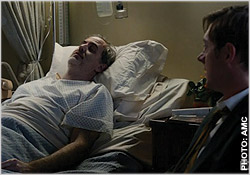 Similarly, Sylvia promised Don that she could wait
“standing on her head upside down” for Dom Don to return.
Similarly, Sylvia promised Don that she could wait
“standing on her head upside down” for Dom Don to return.
But perhaps he shouldn’t have taken away Sylvia’s reading material. Back in the hotel room, stripped of all else,
the devil in the red dress (and remember she gave him "Dante’s Inferno" for light reading on vacation) had too much time on her hands.
She dreams that Don dies, and her Catholic guilt
kicks in. She puts an end to their role play and the whole affair, saying she is ashamed, rather than satisfied. Don is reduced to begging her to stay, tears in his eyes. He does that submissively
creepy kissing-her-hand thing that he did with Peggy after she left him. She resolves to “go home” and make love to Arnold.
Amid all the domination and humiliation, I
really loved the scene between Ted and his dying partner Frank Gleason. It was beautifully acted and written -- the anti-Don and Ted, these two have a genuine friendship based on mutual respect. The
dying partner’s advice was exactly right: “If I wait patiently by the river ,the body of my enemy will float by. ..” he tells him about Don. “Give him the early rounds.
He’ll tire himself out. Go home. Shower. Walk back in like you own half the place.”
Meanwhile, wet from the rain like a mangy dog, unhappily sharing an elevator with the woman who dumped him, Don goes home to Megan. She is animated, and full of plans, suggesting they go back to Hawaii on vacation, in the hopes of resurrecting the marriage. Don just stares at her mouth moving, not hearing a thing.
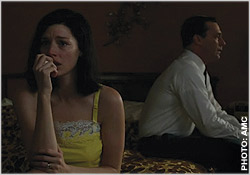 It’s a reference to when he watched her silent
screen test last year — and realized that he didn’t love her. Obviously, Megan has no idea that Don was lost in hell, reading "Dante’s Inferno" while in Hawaii, or that he created
that ad showing a man getting lost in the sand and disappearing there. The suggestion to him equals death.
It’s a reference to when he watched her silent
screen test last year — and realized that he didn’t love her. Obviously, Megan has no idea that Don was lost in hell, reading "Dante’s Inferno" while in Hawaii, or that he created
that ad showing a man getting lost in the sand and disappearing there. The suggestion to him equals death.
The last scene is wonderfully shot — the episode was directed by John Slattery. Megan is wearing a buttercup yellow (as opposed to margarine-colored) nightie, in tears, stationed in front of the TV set at the news that RFK had been assassinated. “They’re shooting everybody,” the demented seer Dorothy Campbell has said to Pete earlier.
As Megan cries, seeing the awful image of RFK lying shot on the floor, Don, who is dressed for work, stands behind her, in a nether zone, not responding to her or the news.
Over the credits, the song “Reach Out of the Darkness” by Friend and Lover (“I think it’s so groovy
now/ That people are finally getting together…”) gets mashed with the audio of the news of Kennedy’s assassination.
Don is lost. As we’ve learned from the show, no one in
life truly has control (except for Matt Weiner).



Great write up for a great episode. I agree that that plane scene was almost too easy, with Don looking so pathetic and Ted so easily in control, in a fake scene. Two things scare me though. 1) If that was Harry Hamlin, geez he looks terrible. Can that much time have passed? 2) In the D/S relationship, it's the sub who is ultimately in control (he/she has the "safe" word to stop it). If Matt Weiner is the dom, then are we all subs? And does anyone know the safe word?
Great analysis, Barbara. Though, I have to say I found this episode quite funny. I didn't think of it as miserable or gloomy at all (until RFK got shot).
Maybe I've grown to dislike Don enough that when he is bested by a peer, I find it humorous. And it seems like all of Pete's scenes were played for laughs—almost slapstick with the mother (also with Harry). To me, it was one of the more humorous episodes of the series right up until the news at the end.
In the 70s I worked with an ad guy who had worked on the RFK advertising. He described for me the evening when he was driving home to Long Island after the California primary victory thinking ahead that he would be working on advertising that would "change the world." Then on the radio, he heard the breaking news from the Ambassador Hotel, and he turned around and went back to the HQ in the city and realized in short order he'd be back to working on hair spray.
Really agree with Carri Bugbee that most of the show was hysterical, but the mother thing is going a lot of whichways with Joan's mother being wise and Pete's mother being alzheimic wise. That account guy whose job was saved also had the good sense to do a suck up to the right person finally and the quid pro quo was more than coffee.
I almost missed the Beany and Cecil line, but lines like that often flowed in agencies referring to "creative people." The favorite one I heard was "he does the work of two people: laurel and hardy."
Always enjoy reading your Madmen recap, Barbara. I get to experience the episode all over again. I enjoyed this week's episode as much as I did The Wheel (my all-time fav). Hats off to the director, John Slattery. Confessions revealed and emotions hidden throughout. Well done.
Great write up. Only one comment: "Meanwhile, the scene in the plane looked so fake, it was like watching a 1930s movie of people driving in car, with only the backdrop moving." If you pay really close attention to the style of Mad Men, it's art directed and styled to look like a movie from that time period. All the sets are a little fake and technicolor. They like to stage things and film them to make it clear everything is a set - camera pans that pass through walls as they walk through a door, for example - and dissolves between scenes that just feel off and old-fashioned. It's actually kinda cool. So yeah, the plane scene was totally in keeping with that set of choices. And that's actually kinda cool.
Barbara, your Mad Men recaps are one of the things I really look forward to each week! Thank you! With The Great Gatsby coming out a couple days before this episode, I wonder if there are parallels? A new generation of filmgoers are pondering: "what makes Gatsby great? or is Gatsby great?" I think each week viewers are asking similar questions about Don. This guy is basically a scumbag, yet a million or so people watch each week to find out what he's up to next. The "dom Don" really demonstrates this. He is a serial philanderer, yet he is also really good at his job (when he's actually interested and in the game). So, while he's a jerk, viewers also know the abused, horrific childhood aspect, which the other characters do not know. The entire series-run I've been asking myself, "why do we like this guy?" Similarly, I've read TGG about 75 times and ask the same of Jay Gatsby. There is something about the American Dream here and the striving for it that turns viewers/readers on.
Thanks, everyone! Bob-- I think you've got somethign there. Mysterious backround, check, unrequited yearning, check, power that only hurts others, c heck.
@Jonathan-- yes, you're right. The plane scene reminded me of the scene in the pilot with Don heading home on the train in the rain. We only saw his single seat and the pane of the rain-streaked window. Thanks Carri, and Roe. I guess it was funnier than I thought initially. I was just very saddened by the thing with Syl. And that's a stupendously sad story about RFK, Tom. And I think we should all ask Jonathan H. how he knows so much about the D&S world. But the safe word is defnitely "dick."
Thanks for the insights. While I have seen every episode and I love Mad Men, I thought Matthew was being too "creative" with the song “Reach Out of the Darkness/I think it’s so groovy now" with the audio of Kennedy’s assassination. Also they need to resolve the name of the new agency or the combined, merged agency. Ted deserves more. Like his name included. It's obvious the liquor should not be unpacked. Especially if he leaves, which is a possibility. Except for his drinking he is trying to do the work. Plus Don has turned into a disgusting "creative." We've lost our relationship with him and wanting him to survive/improve/relate. I wanted Sylvia to slap him, hard. On to the uplifting adventures of next week's episode. Except Pete keeps going down and down and down, as the one constant character/plot point. P.S. "The Gilligan's Island" creative development reference was great. Never heard that one before, in teaching, working or consulting in advertising. For sure, we have all heard of the choice of Maryanne or Ginger? All the best.
Thanks, Larry. I thought it was a little odd that they would actually move in without getting the name straight, or how many accounts they each have!
I just call him Ted or Ted C because I live in fear of having to spell C_H_A_O_U_G_H or something like that!
As always Barbara - I love your reviews.
Don has realized that he is as shallow as his relationships. His notion of have having any control over his life - both personally and professionally - is unraveling before our very eyes.
As for Peggy - I was wondering if her windowless office is an omen for what's to come considering she just left the power office with the power view....? Didn't seem apples to apples to me. But then again, having survived a few mergers in my day, it was a fitting little tidbit.
I laughed out loud, partially with relief, when Don insisted that the farm in the margarine spot be a dairy farm. Until then, I was certain that he was simply phoning it in.
Another great recap, Barbara.
I especially enjoyed watching the two creative masters at work. Ted is inclusive, having everyone in the creative department brainstorm with him.
When Don (who usually works alone) grabs him for a mano-a-mano brainstorming session, Ted reveals his "Gilligan's Island" formula.
We see Don practice his formula of crawling into the bottle and tapping into some lost, lonely feeling from his past, then discover how can the product ease that aching void.
Both creative masters have their ways and it'll be interesting to see them ego-bash their way through the merger.
Barbara, there is nothing wrong with putting all six names on the door. Perhaps with a double door. Can be catchy even if clumsy or not particularly sonorous.
By the way, wasn't Fleischmann's a favorite of Kosher restaurants that didn't want to mix milch mit fleisch.
I also thought during the war, people started using margarine even making it themselves. The war being world war II....guns and margarine, i think, was the phrase.
@Leslie-- good point about Peggy's windowless office. Like sharing with the Xerox machine!
And Nancy and Patrick-- good point about Ted and the team (even if it's a bummer he' s so into rap sessions.) I was thinking that Don's set up was said (and I think they threw in Dorothea Lange just to underscore his anti-modernity.) But maybe showing everything whole and fresh on a farm is a nostalgic way to sell a fake thing-- PepperidgeFarm remembers!
And Tom-- would you know if this was the same Fleishmann family as the yeast? They were the ones who financed the New Yorker!
@Tom, Tom, Tom, Messner, Messner, Messner...
When I used to freelance at your shop back in the nineties, I always felt sorry for the ladies answering the phones who had to go through the recital of the twenty odd names you had acquired by then. One of the great attractions (Besides the money, 'cos you guys always paid well) was the close proximity to "The Ear."
Cheers/George "AdScam" Parker
Another rich mining of an episode, Barbara. Slattery did a masterful directing job (and kudos to him on his self-directing -- the firing scene, with its keenly timed repartee, borders on the magnificent). I agree with Jonathan about the vintage movie aspects -- the camera pans, the technicolor, the close stylized shots with strong physical positioning of the characters in relation to one another -- add at once to the authenticity of the period, while imposing a hyper-reality that lifts us above it.
Having just reread Gatsby, I agree with Bob that there's a strong parallel, starting with the depressed childhood, the assumption of a new name, the reinvention, the riches from rags, the chronic restlessness and inner despair. Reading Gatsby I often thought of Don (when I could push Leonardo out of the picture, thankfully I purchased the book version with the floating eyes rather than the movie tie-in).... I look forward to next week's MadBlog.
@George-- I think the receptionist is still at Messner, Vetere, Berger, Schmetterererreer, etc. saying the name!
And thanks for the MM/GG analysis, Ivy. I especially loved the insight about "chronic restlessness and inner despair." Hope Betty comes back this Sunday, blonde and de-fat suited!
Back in the day (way, way back), I worked at Della Femina, Travisano & Partners. The full agency name was a mouthful for the receptionist who answered all the phones to say over and over and over...well, you get the picture. So it got shortened to Della Femina. One day, she answered the phone and the voice on the other end of the line said, 'This is Ron Travisano and you're fired.' Not a happy day for her.
Yikes, he really fired her? a little over-reactive!
Rich Silverstein gets really exasperated when everyone refers to Goodby, Silverstein as "Goodby."
Yup. After first asking what her name was. We also got mail addressed like this:
Della Femina
Travisano & Partners
Dear Della:
[Formatting won't work here, but you get the drift.]
bernbach didn't seem to mind to place his name third, for rhythm reasons maybe
and the place was usually called Doyle
occasionally doyle dane
while bernbach was the driving force....there was an agency called burke dowling adams and i always firgured burke was first so he must be most important...then a headline in ad age Burke Dowling Adams Dies....one name, but a great one....
And who was Mather anyway?
@Tom...
Burke Dowling Adams would make them a BDA!
Cheers/George "AdScam" Parker